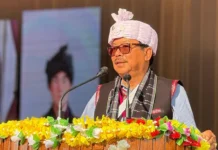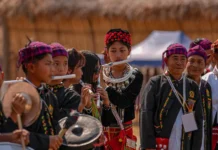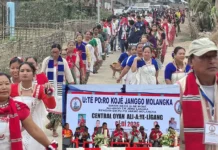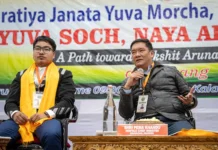[ Tongam Rina ]
The first few years of my life were spent in a small village in East Siang, where my maternal grandfather often took me to traditional council meetings where elderly men gathered in the community hall. I don’t remember what transpired in those meetings, but I remember being given a lot of eggs – boiled or mixed with ginger – wrapped in leafs.
Those days the choice of food was limited, and also it was considered rude to say no to food or drinks served; so it was expected that whatever was served was accepted with gratefulness.
I also remember drinking the local alcoholic beverage, which was served aplenty, from my grandfather’s brass bowl during lunchtime. My grandfather often carried me home from these meetings.
I continued to accompany my grandfather to these meetings whenever I came home during school vacations, till he passed away when I was 14, leaving me utterly heartbroken, and from which I will perhaps take a lifetime to recover. I hold these experiences of the trips to the community hall close to my heart because it was a learning experience of a lifetime. Those were my early lessons on how close the community was, sharing food and drinks and debates, discussions and humour. Those were also my firsthand experiences of seeing women doing everything from cooking to serving to supporting each other – the anchor, but rarely heard. Later on, I learned that they were also the food gatherers. They were there to give strength to each other and draw courage from the experiences they had gone through, which was never a part of the discussions even as men in traditional councils give out their dictums. I don’t remember women being part of the formal meetings, though they were everywhere.
When I look back, my maternal grandmothers – my grandfather’s two wives – were absent from those meetings. They would be in the fields during the day and at home in the evening to cook food and ready the beverages and dinner for all the men who would be part of the meeting. My grandmothers were my first teachers who made sure that I attended school, even though it meant being apart from them for most part of the year.
Those gatherings in the community hall were also my first lessons on saying yes, because it was the accepted norm.
I was forbidden from eating eggs because of allergic reaction, but it would have been considered rude if I did not accept what was offered, even though eating one would have potentially landed me in a hospital.
I still eat and drink whatever is offered when I am in a village, but I am wiser. With great difficulty I have learnt to say no to eggs, not because it will land me in a hospital but because wasting food is not acceptable.
I have attended some meetings since then, and I have not seen much change. I still see women being part of the crowd but not as decision-makers in public spaces.
I see women everywhere, excelling everywhere. The economy of this state is totally dependent on women. They are the ones who are in the cultivation fields and the vegetable markets and the meat shops. They have even taken over the fish markets which otherwise was not their domain till a few years ago. Women have lapped up every opportunity whenever they have been given a chance.
Women are voters and campaigners. They are organizers. A candidate’s victory in an election is not solely based on how much money he can spend but how women manage the election campaign and the community kitchens that they run. They are not allowed to complain or pull a rude face.
I have often wondered why women, who are at the core of elections, are not MLAs or MPs themselves when they are the reason for men winning elections and are far better leaders.
The panchayat elections are due, and there is 33 percent reservation for women. I am hoping that, like other years, there will be more women than the prescribed number. I wish there were reservation for the LGBTQI community too, though this state has effectively decided to ignore their existence. Perhaps next time.
Some behaviours have changed, but not all. The other day, I attended a pre-budget discussion called by the Pema Khandu government as a volunteer of the Arunachal Pradesh Women’s Welfare Society. On the first day only five organizations turned up. The chamber of commerce and two community organizations were represented by men. The two were women’s organizations, including the Arunachal Pradesh State Commission for Women.
Some days later, community organizations eventually had a meeting with DCM Chowna Mein, who is also the finance minister. In that meeting, the only woman present was YW Ringu, the boss of the finance department.
I have not gone through the presentations of these community organizations, other than reading the press release issued by the government. What overwhelmed me was the all-men picture of that meeting. Three decades later, it reminded me of the traditional council meetings of my childhood. The only change was tea and coffee in place of home-brewed alcoholic drink, sandwiches and Indian sweets in place of eggs.
Did they have a discussion with the women’s wings before they finalized their points for inclusion in the budget? I wonder. Most of the community organizations have women’s wings. The community and student organizations have women’s wings. We should take it forward by opening a general pool, inclusive of all genders: separate men’s, women’s and LGBTQI’s wings. That’s not too difficult to do, is it? After all, it takes all sorts to make a rainbow.




